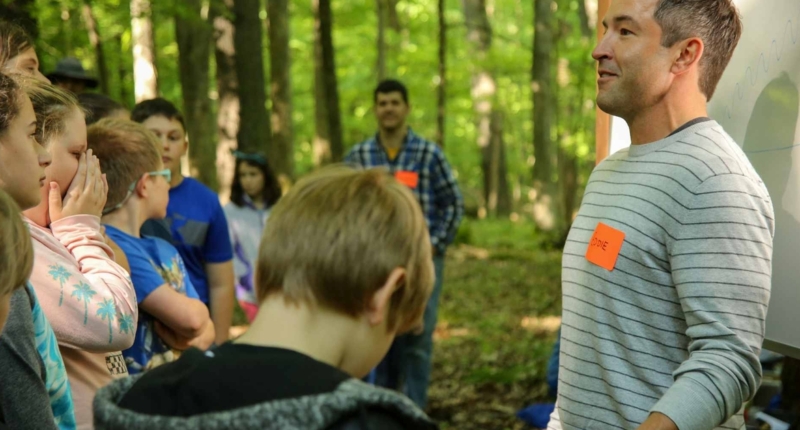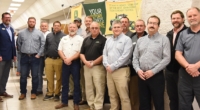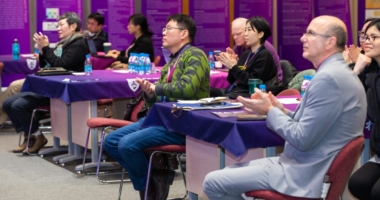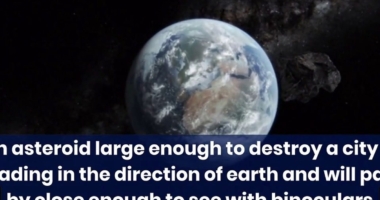WVU is actively working to make a positive impact on the public through their land-grant mission, with the Bridge Initiative for Science and Technology Policy, Leadership, and Communications born to help researchers with their policy work. Their work on the “Waters of West Virginia” led to policy suggestions for water management infrastructure and potential infectious disease outbreaks linked to water. Carbon dioxide removal is the Initiative’s current focus, with WVU researchers working to identify and remove barriers to market entry for small family forest owners. Meanwhile, WVU’s Regional Research Institute is planning to expand collaborations and increase data-driven analysis to support policymaking. WVU’s fifth annual Research Week will celebrate the faculty, staff, and students that make WVU an R1 institution.
West Virginia University’s Unique Research Efforts
West Virginia University (WVU) is renowned for its research efforts that extend beyond its labs, experimental sites, and classrooms. According to Fred King, Vice President for Research at WVU, the university’s research endeavors are unique when compared to most universities. Unlike other institutions that conduct research for its own sake, WVU stays true to its land-grant mission, which is to seek solutions to society’s most pressing challenges to benefit individuals and communities.
King, a chemist, has been instrumental in helping WVU attain new heights in research since 2012. Year after year, WVU has set records for external funding for research and sponsored programs, with the latest funding record topping $203 million for fiscal year 2021. Additionally, WVU retained R1 status for “very high research activity” a year later, which is the most prestigious designation for research-focused institutions.
Apart from these accolades, the WVU Research Office offers a range of initiatives under its umbrella that directly serves the people of West Virginia. One such initiative is the Student and Faculty Innovation program, which offers resources to everyone, not just the University community, to develop start-up companies and bring services and products to commercialization.
Dr. Nova Szoka, associate professor of bariatric surgery at WVU, is one of the individuals who received support from WVU’s Student and Faculty Innovation program. She had an idea of using near-infrared technology to help surgeons see tools more clearly. She approached Erienne Olesh, executive director of Student and Faculty Innovation, and with the program’s support, Szoka and business partner Mara McFadden established Endolumik, a start-up company focused on developing fluorescence-guided surgical devices. Endolumik has received approval from the Food and Drug Administration, the first through the FDA’s new Safer Technology Program, for Szoka’s invention.
WVU’s research initiatives, combined with its land-grant mission, have enabled the university to make a significant impact on West Virginia’s communities. The University’s efforts to benefit individuals and communities through research make it stand out from other institutions.
WVU’s Research Office Provides Resources for Innovation and Entrepreneurship in West Virginia
West Virginia University’s Research Office offers a range of initiatives that support innovation and entrepreneurship in West Virginia. One of its most successful ventures is the Student and Faculty Innovation program, which provides resources for everyone, not just the University community, to develop start-up companies and bring services and products to commercialization. Dr. Nova Szoka, an associate professor of bariatric surgery at WVU, is one of the individuals who has received support from the program. She developed a gastric calibration tube that uses fluorescence-guided technology to enable visualization of the tube during surgery. The device is slated for commercial launch this spring.
Szoka received help from Erienne Olesh, executive director of Student and Faculty Innovation, who led her through the steps of invention disclosure and encouraged her to apply for a West Virginia Clinical and Translational Science Institute Launch Pilot Grant, which enabled her to develop and test a prototype of the device. James Dottavio, Director of WVU Office of Technology Transfer, guided Szoka through the commercialization and patent process. Szoka believes that these experiences can inspire other West Virginians to turn their ideas into reality.
The WVU Research Office runs the National Science Foundation’s Innovation Corps programs in the state, which are open to West Virginians who want to learn about business models and customer discovery. Through WVU, participants have access to a free course that guides them through the business model canvas and the creation of a value-driven product.
The Research Office has also partnered with the LaunchLab to introduce a Veterans’ entrepreneurship grant program that is open to military Veterans and their family members in the state. The program provides free resources to Veteran entrepreneurs who need help either starting or growing a business. An upcoming pitch competition will offer more than $30,000 in technical assistance awards and prizes.
The Bridge Initiative for Science and Technology Policy, Leadership and Communications was established in 2020 with the arrival of Joan Centrella as its director. The initiative aims to bridge gaps in science and technology policy, leadership, and communications. Through the Research Office, WVU is making significant strides in supporting West Virginia’s communities, enabling them to benefit from WVU’s research and innovation efforts.
WVU’s Bridge Initiative Focuses on Water Management and Carbon Dioxide Removal
The Bridge Initiative for Science and Technology Policy, Leadership and Communications, established in 2020 at West Virginia University, aims to bridge gaps in science and technology policy, leadership, and communications. The initiative focuses on making positive impacts on the public good through the University’s land-grant mission. Joan Centrella, its director, stated that researchers at WVU are keenly interested in having their work benefit individuals and communities by seeking solutions to society’s most pressing challenges.
The Bridge Initiative’s team comprises more than two dozen WVU researchers from various colleges, including the John Chambers College of Business and Economics, Davis College of Agriculture, Natural Resources and Design, Eberly College of Arts and Sciences, Benjamin M. Statler College of Engineering and Mineral Resources, Extension, and Energy Institute. The team developed a policymaker guide, briefs, and study questions surrounding water management in West Virginia. Recommendations included funding a study to address water management infrastructure and urging the state to increase surveillance and reporting on potential infectious disease outbreaks linked to water.
Bridge has now shifted its focus to opportunities and challenges for carbon dioxide removal and storage in West Virginia. Carbon dioxide removal has a rapidly growing market, and West Virginia has abundant forests and geologic resources that can make it a leader in this arena. Edward Brzostek, associate professor of biology and a Bridge Faculty Fellow, highlighted that a carbon dioxide removal economy can enhance the sustainability of the state’s economy and provide economic benefits to West Virginians, including small family forest owners. The Bridge team recently met with members of the West Virginia House of Delegates to explain how forest carbon credits could work and to highlight the benefits for West Virginia residents.
Recommendations from Bridge’s study on carbon dioxide removal include investing in economic incentives for carbon dioxide removal activities, like reforestation, and storage in southern West Virginia and other disadvantaged communities in the state. Through its initiatives, WVU is making significant strides in supporting West Virginia’s communities, enabling them to benefit from WVU’s research and innovation efforts.
WVU Regional Research Institute: Expanding Collaborations for Betterment of West Virginia and Appalachia
The WVU Regional Research Institute is internationally known for its interdisciplinary research on economic and social development in the Appalachian region. The new director of RRI, Heather Stephens, has developed a plan to expand collaborations both at WVU and with other national and international partners to benefit West Virginia and Appalachia.
Stephens’ vision is to expand collaborations with experts outside the University, especially on research questions related to the economy of the state and region. She aims to increase data-driven analysis to support policymaking to develop policies that work for different regions. Her research focuses on energy, environmental quality, labor markets, entrepreneurship, health, and regional growth.
WVU Research Week to Celebrate Public Contributions
WVU research contributions to the public will be celebrated during the fifth annual Research Week, starting from March 20. The Research Week highlights the faculty, staff, and students who shape the University as an R1 institution. The events include research and poster sessions, networking events, and workshops that span the campus and various platforms.
Research Week started in the academic year 2018-2019, and it aims to showcase the impact of WVU’s research and innovation on society. Through these events, WVU is emphasizing the importance of research, promoting interdisciplinary research, and supporting the dissemination of research findings.
Don’t miss interesting posts on Famousbio










